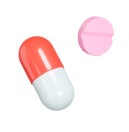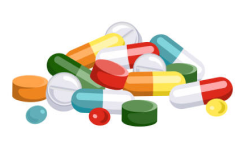Uses
What is Calcium and Vitamin D for?
Calcium is a mineral that helps build strong bones and teeth. Maintaining an adequate intake of calcium is important to promote good bone health and prevent osteoporosis and fractures. Vitamin D helps to improve the absorption of calcium in the body.
How should I take or use Calcium and Vitamin D?
The usual recommended dose is 1 to 2 tablets daily. Follow the instructions as provided in the label or check with your healthcare provider for advice. The Recommended Dietary Allowances (RDA) for Calcium intake is as follows:
| Age Groups | RDA for Calcium |
| Adolescents (10-18 years) | 1000mg |
| Adults (19-50 years) | 800mg |
| Adults (51 years and above) | 1000mg |
| Breastfeeding/pregnant | 1000mg |
Precaution
What food or medication should I avoid when I take or use Calcium and Vitamin D?
Limit your intake of coffee and alcohol and avoid smoking to reduce bone loss.
Side Effects
What are some common side effects of Calcium and Vitamin D?
Calcium supplements cause few, if any, side effects. However, some people may experience constipation, bloating or gas. Drink extra fluids and eat more fruits and vegetables to prevent constipation.
Handling
How should I store Calcium and Vitamin D?
- Keep away from children
- Keep in a cool, dry place, away from direct sunlight
- Store at room temperature
For more information
What else should I know about Calcium and Vitamin D?
In addition to taking calcium supplements, you can also increase your calcium intake by eating more calcium-rich foods, such as milk, cheese, ikan bilis, sardines, tofu, spinach and kai lan.
Your body needs vitamin D to absorb calcium. You can obtain vitamin D from direct sunlight. Therefore, outdoor activities such as walking or gardening are beneficial to getting enough Vitamin D.
You can also obtain Vitamin D from foods such as cereals, eggs, oily fish (salmon, cod, mackerel), certain brands of milk and Vitamin D-containing supplements such as Calcium and Vitamin D Tablets.
Calcium may reduce the absorption of some medications, such as certain antibiotics and supplements (e.g. iron). It should be spaced at least 1 to 2 hours apart from these medicines. Inform your doctor or pharmacist about any other medications you may be taking or starting before you begin taking calcium supplements.
Do not take if you are:
- Allergic to any of the ingredients
- Have hypercalcemia (high calcium level in blood), hypercalciuria (excessive urinary elimination of calcium)
Disclaimers
If you take more than the recommended dose, please seek medical advice immediately. The information provided on this page does not replace information from your healthcare professional. Please consult your healthcare professional for more information.
This article is jointly developed by members of the National Medication Information workgroup. The workgroup consists of cluster partners (National Healthcare Group, National University Health System, and SingHealth), community pharmacies (Guardian, Unity, and Watsons), and the Pharmaceutical Society of Singapore. The content does not reflect drug availability and supply information in pharmacies and healthcare institutions. You are advised to check with the respective institutions for such information.
Contributed by
Last Updated on October 2017

Need More Medicine?
Use Medicine Order Service on HealthBuddy.

Medicines Reminder
Get reminders and chart progress on HealthBuddy.




















